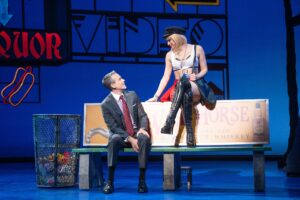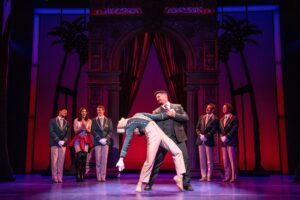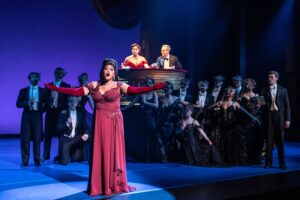Pretty Woman, The Musical
Gerry Marshall & J.F. Lawton (Book); Bryan Adams & Jim Vallance (Music & Lyrics)
Based on Touchstone Pictures motion picture by J.F. Lawton
Broadway San Jose

A billionaire New Yorker who buys at bargain prices troubled companies only to dismantle them and sell the pieces for millions in profits picks up a prostitute in a shady section of Hollywood and transforms her into a princess and himself into the prince who saves her. Only in romantic comedies could such a storyline succeed, but succeed it did as J.F. Lawton’s 1990 movie, Pretty Woman, achieved the highest number of ticket sales of all times for a romantic comedy in the U.S.
Capitalizing on the movie’s enduring popularity, Lawton along with Gerry Marshall wrote the book for the 2018 premiering on Broadway Pretty Woman, The Musical (Bryan Adams & Jim Vallance, music & lyrics). The musical was widely panned by many critics as just a re-hashed version of the same jokes, set-ups, and even dialog as the movie. But as witnessed by the packed and cheering audience at Broadway San Jose’s opening night of the currently touring Pretty Woman, The Musical, the movie’s fans are still avid in their approval of a Cinderella-like story that in 2023 does seem somewhat outdated and out-of-sync with today’s gender dynamics and norms.

After a mediocre opening number to kick off the night in which neither the initial music nor the gymnastic choreography plows any new ground not already seen in dozens of other, contemporary musicals, we meet Vivian Ward, a woman of the streets in her stiletto, hip-hugging boots and an outfit that only semi-covers the more private parts of her body. We will discover that Vivian is from Georgia and has in fact had a tough life, raised by a mother who called her a “bum magnet” because of the boys she dated. The life she leads in selling her body to the highest bidder is not the path she wishes for herself, as Jessie Davidson sings in her opening number, “I just long to be free; I just want to be anywhere but here.”
Vivian happens upon a man dressed in Park Avenue style looking quite lost as he sits on a bench in a part of Hollywood known for its shady nightlife of cheap bars, tattoo galleries, and a parade of women in skippy attire. For $5, she offers to give him directions back to the posh Regent Beverley Wilshire Hotel; for $20, she agrees to drive his loaned car with a stick shift; and for $300, she spends the night with him in the penthouse of the lah-tee-dah hotel of the stars. Strange sparks of surprise attraction begin to stir in both, with Edward singing “There’s Something about Her” and Vivian reflecting in song, “I Could Get Used to This.”

Facing a week of stress as he works on a deal to take over a shipbuilding company, Edward Lewis offers Vivian $3000 and a Rodeo Drive, new wardrobe to spend the next six days (and of course nights) with him at the Wilshire. The subsequent events unfold with much opportunity for audience laughs as the girl from the sticks in Georgia and the slums of Hollywood comes into contact with snobby sales clerks; high-fashion patrons of expensive restaurants, the polo grounds, and the opera; and a hotel staff that shift from stiff disdain to genuine affection for her. All along the way, Edward – the corporate robber baron who recently even closed for profit his deceased dad’s company – begins to relax his obsession for wealth accumulation and to reevaluate the course his own life is taking, with Adam Pascal singing in “Freedom,” “I want freedom, sweet freedom; I know it sounds strange, but I think I can change.”
Both Jessie Davidson and Adam Pascal excel as actors in portraying Vivian and Edward’s rather predictable but highly amusing sequence of oft topsy-turvy events peppered with sensuous nights that they share during their six-day business arrangement. Each aptly convinces us of their character’s fleeting desires of the moment and emerging dreams for the future as well as their genuine surprises of new possibilities along with their suspects of how much they or the other can really change to fulfill those possibilities.
Vivian in particular consistently is the one to call things like they really are, with lines straight from the musical’s parenting movie that Jessie Davidson delivers with smacking zip and evident smirk. Of Edward’s job, she notes, “So you don’t buy anything; you don’t make anything; you’re like stealing cars to sell the parts.” When asked at the high-society polo grounds if she were a member, she retorts with a laugh, “Oh no, I would never join a club that would take me as a member.”
Where both lead actors are less successful consistently is in the musical aspects of their roles. Jessie Davidson too often simply over-sings, blasting number after number consistently at Volume 10, leaving little for a mixture of interpretations and frankly singing to the point of losing some of the natural beauty of her otherwise strong voice (as in “I Can’t Go Back”). However, when she does back off and sing more from the heart and at a volume more soft-to-mid-range, her Vivian finds a voice that works wonderfully in conveying emotions that we can believe (as in “This Is My Life” and the finale “Together Forever”).
More strange is the casting of Adam Pascal when it comes to the vocal parts of his role. His singing voice is not what one would expect of a New York, billionaire businessman. There is often a throaty edge and roughness and an accent hinting of the South, all of which at times seem more appropriate for a Nashville stage where country music reigns.

Fortunately, the characters supporting the romantic journey of these two to a person knock it out of the park time and again with voices, acting, and dancing that bring much spark and sizzle. One of best voices of the night belongs to Mia Gerachis ,who on opening night stepped in as understudy to play Vivian’s apartment mate and best friend, Kit De Luca (also a woman of the streets, in a part usually played by Jessica Crouch). Not only is Kit a blast to watch as she saunters into scenes with a boldness full of attracting cockiness; but when Mia Gerachis sings, she can delve into smoky, sultry tones; vibrate pulsing, emotional phrases; and then belt with clarity with a fervor that cannot help but impress.
Likewise, Travis Ward-Osborne, whose street-roaming pal of the prostitutes goes by the nomenclature of Happy Man, also plays a variety of other both cameo and ongoing roles including Mr. Thompson, the Wilshire’s manager, and the manager of an upscale dress shop, Nellie’s, on Rodeo Drive. To all, he brings great heart, sparkling personalities, and an ability to sing solidly and sumptuously in voices that match the differing personas.

Whenever hotel room-service boy, Giulio, makes a sudden, often unexpected appearance, the result is invariably a crowd-wowing display of song and dance by Trent Soyster who – much like a spry pixie – leaps, twirls, and at times almost flies through dance moves galore while also singing with a voice that is both innocently boyish and purposively devilish. When he is caught by Hotel Manager Mr. Thompson dancing like Fred Astaire to his Ginger Rogers mop, Travis Ward-Osborne becomes his dancing partner; and the two mimic with style the famous dancing pair of the ‘30s big screen. The two also dance in tango dips while joined by a quartet of hotel staff singing in fabulous falsetto, “On a Night Like Tonight,” just one of a number of instances where Jerry Mitchell’s joint role as director and choreographer results in an ensemble-populated scene that is fantastically fun to watch.

Other cast notables include Matthew Stocke as the sleeziest of greedy corporate lawyers whose slime seeps into his behavior toward Vivian; Jordan Alexander as the ship-building company’s owner, David Morse, who also knows how to dance the night away; and Jade Amber who performs with stunning vocals both as nightclub and opera singer.
Broadway splash and splendor is in full presence through the grand-scale, oft-changing set design of David Rockwell; the exacting and mood-setting lighting design of Kenneth Posner and Philip S. Rosenberg; and especially in the huge array of lavish, eye-popping costumes designed by Gregg Barnes.
While I am not a member of the vast fan base who still like to stream Pretty Woman the movie, I must admit that Pretty Woman, The Musical has some magnetic charm, fun, and appeal for an evening of mindless and carefree entertainment. One could do much worse than decide to grab a ticket and enjoy San Jose Broadway’s touring Pretty Woman before the romantic comedy heads to the next stop on its extensive, nation-wide tour (to include San Francisco, April 25-30, 2023).
Rating: 4 E
Pretty Woman, The Musical continues through March 26, 2023 in touring production by San Jose Broadway at the San Jose Center for the Performing Arts, 255 Almaden Blvd., San Jose, CA. Tickets are available online at https://broadwaysanjose.com or through the San Jose Civic Box Office, 135 W. San Carlos Street, San Jose, Tuesday – Saturday 12 – 5 p.m. (phone, 408-792, 4111).
Photo Credit: Matthew Murphy for MurphyMade
